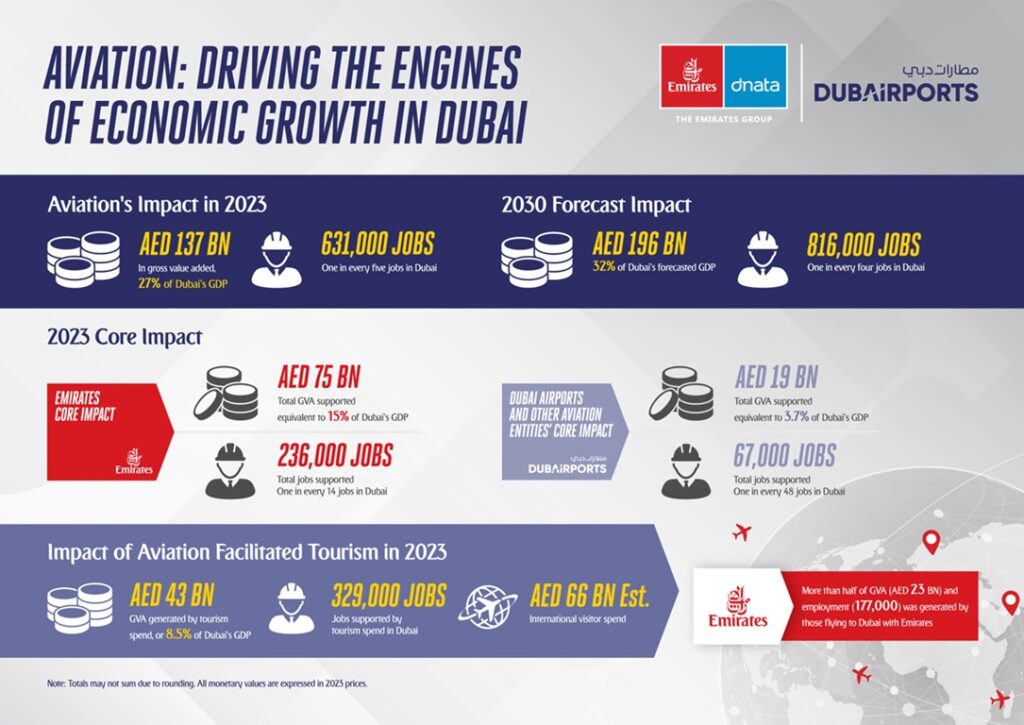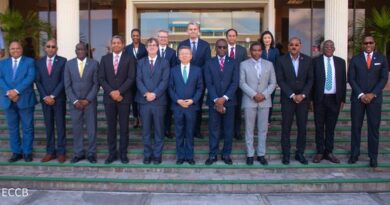Aviation Sector Powers Dubai’s Economy, Driving GDP and Job Growth
The latest economic impact report by Emirates Group and Dubai Airports highlights aviation as a powerhouse in Dubai’s economy, reinforcing its role as an essential contributor and catalyst for growth.
The sector accounted for 27% of Dubai’s GDP in 2023, with an economic contribution of AED 137 billion (USD 37.3 billion). By 2030, this share is expected to grow to 32% of Dubai’s projected GDP, according to research from Oxford Economics.
Aviation’s role goes beyond core activities like passenger and cargo flights; it encompasses supply chain impacts, wage-funded consumption, and tourism. In 2023 alone, the sector supported over 630,000 jobs, with projections to add another 185,000 jobs by 2030. The tourism that aviation facilitates added AED 43 billion (USD 11.8 billion) to Dubai’s economy, with expectations to increase by over 40% by 2030.
According to HH Sheikh Ahmed bin Saeed Al Maktoum, Chairman and Chief Executive of Emirates Airline & Group, Dubai’s aviation sector has been fundamental to the emirate’s economic development, aligning closely with Dubai’s D33 Economic Agenda, which seeks to strengthen trade, tourism, and investment on a global stage.
Major investments in Dubai International Airport and the new Dubai World Central – Al Maktoum International are aimed at meeting growing air travel demands and futureproofing Dubai’s position in global aviation.
The new AED 128 billion facility will expand capacity fivefold, serving up to 260 million passengers annually with 400 aircraft stands upon full completion. These developments are expected to contribute an additional AED 6.1 billion to Dubai’s GDP by 2030 and support 132,000 jobs.
Dubai’s appeal as a global destination owes much to its robust aviation infrastructure. Tourism spending driven by international visitors flying to Dubai amounted to AED 66 billion in 2023, with a significant portion of this generated by Emirates flights.
These visitors spent an average of AED 4,300, underscoring aviation’s impact on Dubai’s hospitality and retail sectors. This tourism-facilitated spending is projected to rise to AED 63 billion by 2030, supporting nearly one in eight jobs across the emirate.
The D33 agenda seeks to position Dubai as one of the top five logistics hubs worldwide and expand its trade network to 400 destinations. Investment in aviation is seen as critical to these goals, with Dubai’s airports enhancing the emirate’s connectivity and supporting a globally competitive economy.
The full Oxford Economics report, The Economic Impact of Aviation in Dubai, offers an in-depth analysis of these contributions and projections, underscoring aviation’s role in shaping the future of Dubai’s economy.



